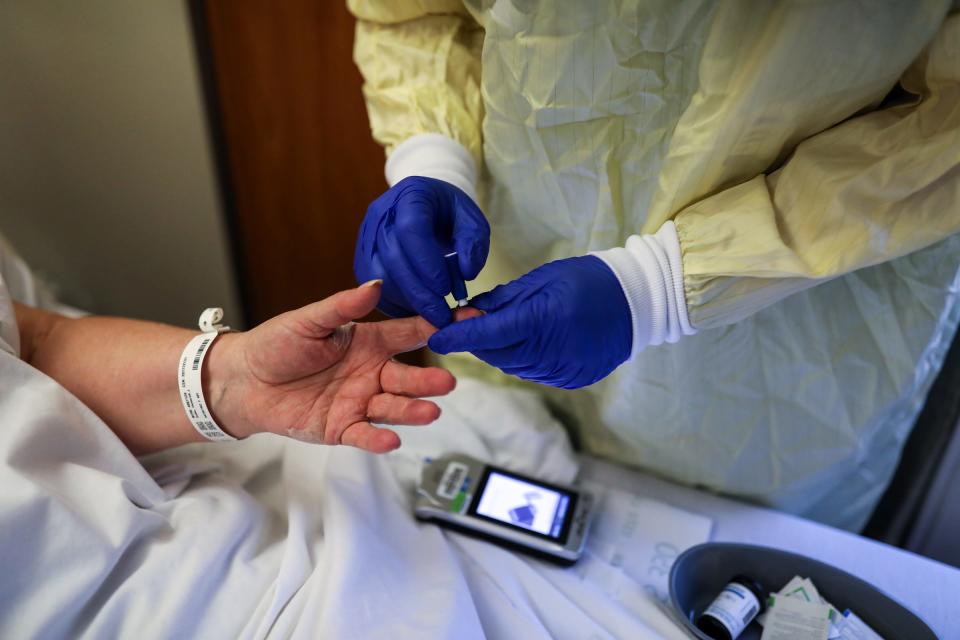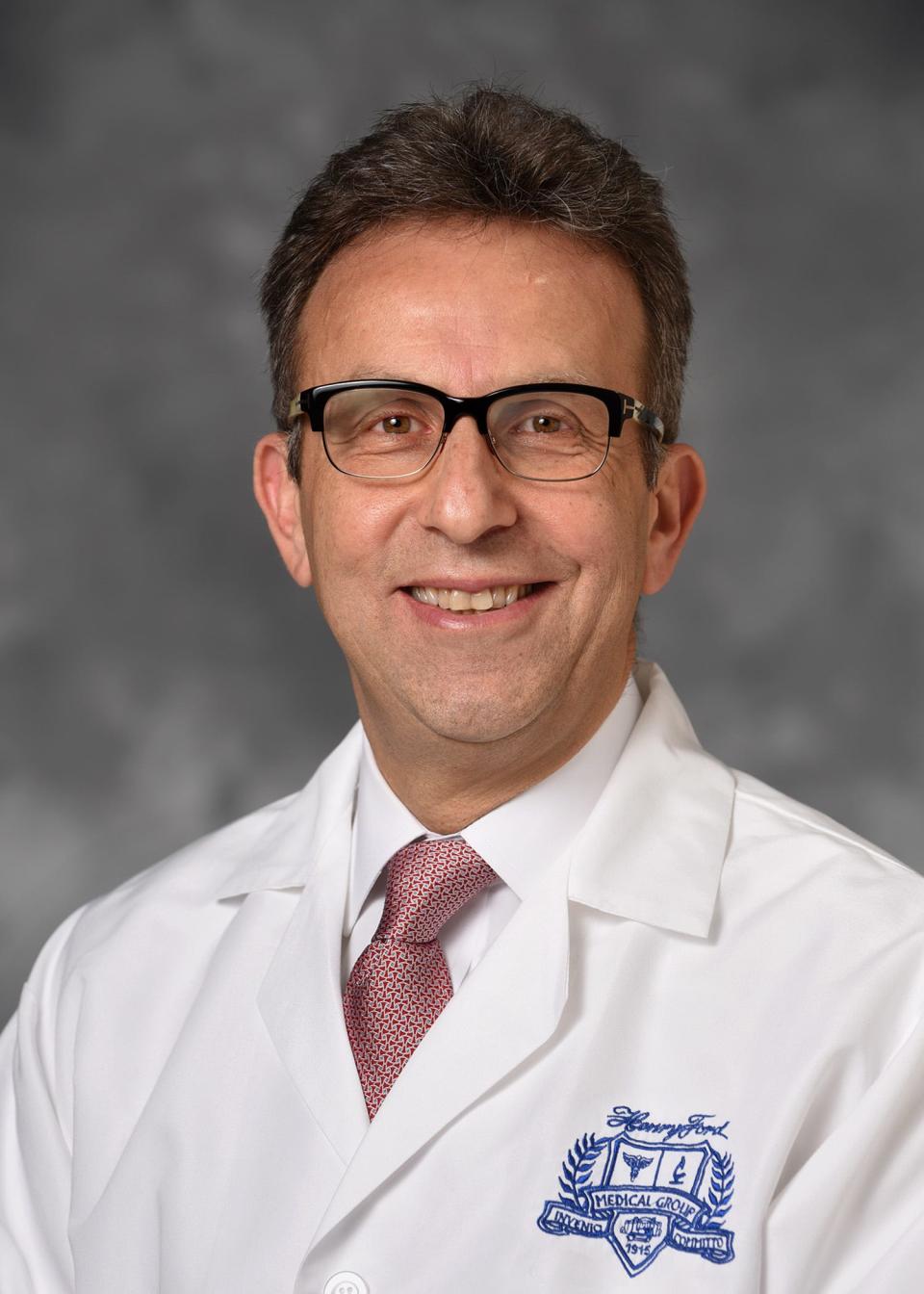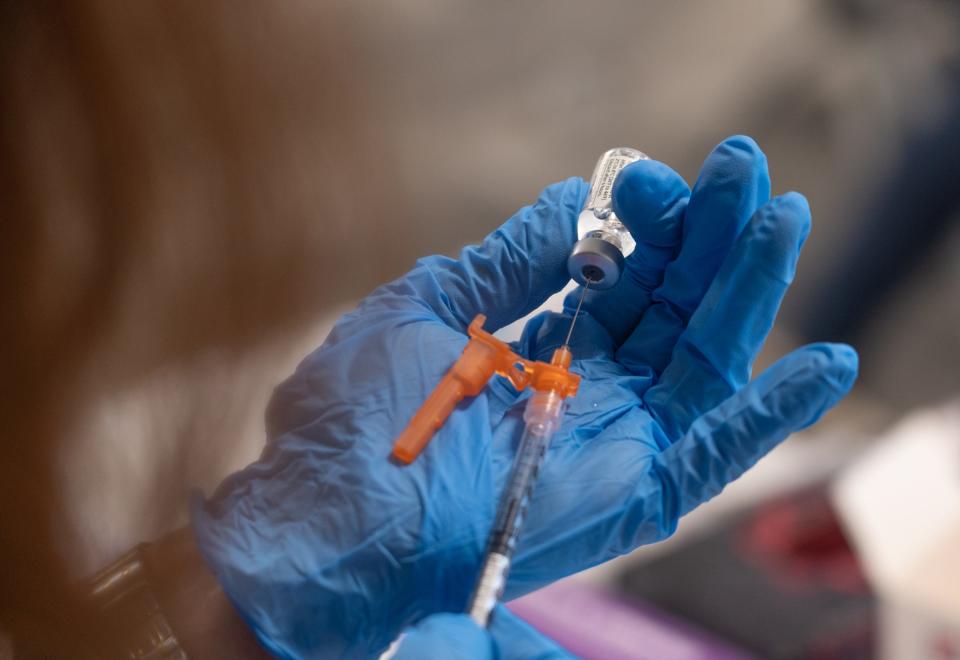Michigan hospitals near breaking point with COVID-19, other patients
Michigan hospitals are near the breaking point with patients battling COVID-19 and other illnesses during the state's fourth coronavirus surge — with some health systems saying they have surpassed pandemic peaks from before COVID-19 vaccines were available.
"We're now well beyond anything we've seen before here in west Michigan with a number of hospitalized patients, at least at Spectrum Health," said Dr. Darryl Elmouchi, president of Spectrum Health West Michigan. "I wish I could say we're on the way down."
Rather, he said, trends suggest things could get worse before they get better.
With 23% to 25% of coronavirus tests returning positive results at Spectrum, Elmouchi said, "this is really driving through infections, future hospitalizations, and, unfortunately, future deaths."
On Friday, 4,360 Michiganders were hospitalized with confirmed cases of the virus, according to state data. That's about double the number of people who were hospitalized with COVID-19 just one month ago, when there were 2,183.
The number of new daily cases rose on Friday, too, averaging 9,222 per day over the last two days, the state reported.
Leaders from three western Michigan hospital systems and two in metro Detroit said Friday that the majority of patients hospitalized with COVID-19 are unvaccinated, as are the sickest, who need intensive care and ventilators.
"We're dealing with a really serious situation," said David Claeys, co-chief operating officer of Beaumont Health and president of Beaumont Hospital, Dearborn and Farmington Hills.

More: 3rd Michigan hospital to get federal help to care for COVID-19, other patients in surge
More: COVID-19 hospitalizations climb in Michigan as nation braces for emerging omicron variant
The situation had escalated in late November to the point where Gov. Gretchen Whitmer asked the federal government to send emergency medical strike teams to assist the state's hospitals.
Beaumont Dearborn and two other hospitals in the state — Spectrum Health Butterworth Hospital in Grand Rapids and Covenant HealthCare in Saginaw — are getting federal help to manage the crisis.
Teams of about two-dozen doctors, nurses and respiratory therapists are helping the strained workforces and caring for critical patients at each facility.
Five additional Michigan facilities have had requests validated by the federal assessment team, meaning they are eligible for consideration when the federal government has additional teams to deploy, said Lynn Sutfin, spokeswoman for the state health department. They are: Mercy Health in Muskegon; Munson Healthcare in Traverse City; Bronson Methodist Hospital in Kalamazoo; Sparrow Hospital in Lansing; and Beaumont Hospital in Troy.
But it's unclear how soon federal help could come to those hospitals, if at all.
A 23-member U.S. Army medical team began a 30-day stint at Beaumont Hospital, Dearborn, on Friday, working in the intensive care unit. Fourteen critical care nurses, four doctors and two respiratory therapists, as well as three in command and control, are assisting.
Claeys said Beaumont Health has about 620 COVID-19 patients across its eight hospitals. About 110 are at the Dearborn location, where patient volumes have risen about 200% since Sept. 30.
More: Detroit Mayor Mike Duggan exploring COVID-19 vaccine mandate for appointees in his office
In western Michigan, Elmouchi said the number of COVID-19 inpatients at Spectrum on Friday was "a very high 455." It was almost its record, which was set two days ago. There were 126 adult ICU patients and one pediatric ICU patient, he said.
"This is beyond capacity, and as we've talked about for a number of weeks, those numbers keep going up," he said.
Dr. Peter Hahn, president and CEO of University of Michigan Health-West, said it hit its highest COVID-19 inpatient census at 80 at the end of last week and has been hovering between the high 60s to mid-70s for about three weeks. He said more than 70 procedures were canceled or delayed in the last two weeks because of staffing and bed availability.
More: Taylor man declined COVID-19 shot and nearly died. 'Get vaccinated ... it's a real disease'
More: COVID-19 hospitalizations climb in Michigan as nation braces for emerging omicron variant
Dr. Matt Biersack, president of Mercy Health St. Mary's, said its intensive care units are completely full and 10 additional ventilators were due to arrive Friday to support the demands of critically ill patients.
Mercy Health St. Mary's opened an additional nursing unit to handle the swelling patient load, limited visitors and canceled or postponed surgical procedures, such as joint replacements and back surgeries.
Elmouchi said patients may be placed in areas such as pre- and post-anesthesia units and even the operating room could be used, if needed.

There were 420 COVID-19 hospitalizations across the Henry Ford Health System, with another 30 patients with the virus waiting to be admitted from the emergency department — a more than 20% increase from Nov. 22, Dr. Adnan Munkarah, executive vice president and chief clinical officer, said Friday.
A year ago, he said, the health system had 499 COVID-19 patients.
"So we are getting very close to the numbers that we had a year ago, despite the fact that now we have vaccines that are available," Munkarah said. "Unfortunately, we are not at the rate that we would like to see, from the vaccination perspective, of the community. What we have, is we do have a solution that can help us."
Munkarah said the vast majority of the vaccinated patients have at least one underlying health condition that puts them at risk for severe disease from COVID-19 or are elderly.
"Only 1% of our vaccinated people are in the hospital without a specific medical comorbidity. ... The vaccinated people are significantly protected," he said.
About 55% of the state's total population is fully vaccinated, according to the U.S. Centers for Disease Control and Prevention. More than 1.6 million additional or booster doses have been administered in Michigan, the state health department reports.

Michigan is one of the worst states in the country in terms of COVID-19 cases per 100,000 residents in the last seven days, per the CDC's COVID-19 data tracker.
Bob Riney, Henry Ford Health's COO and president of health care operations, said the health system is "very close" to needing to ask for federal help. He said it is recruiting workers, has a number of nurses and other allied health professionals in orientation and training classes, and has redeployed some nurses from less acute settings to acute settings.
"If these numbers continue to go up 10% or 20% every couple of weeks the way that we're seeing it, we will be looking for alternative help quite quickly," he said.
Riney said because of the existing and significant rise in COVID-19 cases, two hospitals have changed their visitor policies, limiting how many loved ones can visit patients. The health system already has had to postpone some elective procedures.
If an additional 100 people come to Henry Ford for COVID-19 care, Riney said the five-hospital health system would have to curtail those elective procedures even more.
More: Michigan shatters peak COVID-19 case rate. 1 in 10 cases in US are from the state
He told the story of a nurse manager of an ICU unit at Henry Ford Macomb Hospital that was filled with very ill, unvaccinated patients.
"She said, 'It's heartbreaking for me to tell my staff: Please continue to give up your holidays. Please continue to work six shifts in a row. Please continue to stress yourself beyond imagination,' when the perception is that the community's not meeting us halfway in this fight," Riney said. He noted that the Macomb hospital has the health system's highest number of COVID-19 hospitalizations at 135 patients.
"We can get through this," he said, "but we need help."
Contact Christina Hall: chall@freepress.com. Follow her on Twitter: @challreporter.
Support local journalism. Subscribe to the Free Press.
This article originally appeared on Detroit Free Press: Michigan hospitals near breaking point with COVID-19, other patients

